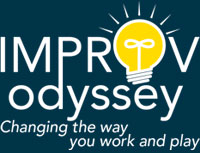Some Thoughts on Improvising
I was looking through my journal trying to find what to write about as my next blog entry. I came across a stream of consciousness document I simply called “Ramblings”. I often ramble on trying to find a subject to expound on. In re-reading this old journal entry, I found it was pretty good advice.. read more →
The Paradox of Side-Coaching
Solving my “Shut-Off” “My work is not Psychodrama!! Never use your own tears! Use the character’s tears!” Viola proclaimed this very emphatically when we would try to work out our personal problems in a scene. Some actors in our workshop were trained to use ‘sense memory’ and transfer the sadness of a personal event.. read more →
IMPROV and the ROI
“Bottom line, how will Improv increase our sales, improve our morale, or our team? What guarantees do we have that everyone is going to benefit from this training? What can we expect to see after your work with us is over? Will we be a more productive workforce? Can we measure that? Will our staff.. read more →
FOCUS – Process Creates Story
More commentary on Spolin’s Tips and Pointers Pointer # 9 — The energy released in solving the problem, flowing through the Where, Who, and What, forms the scene. Taken from “Improvisation for the Theater” by Viola Spolin; 3rd Edition, Northwestern University Press. Solving a challenging problem constitutes a strong FOCUS. Viola Spolin used to call.. read more →
Commentary on Spolin’s Tips and Pointers: Part 1
How we do something is the process of doing (right now!). Pre-planning “How” makes process impossible and so becomes resistance to the focus of the exercise, and no “explosion” or spontaneity can take place, making any change or alterations in the student-actor impossible. True improvisation re-shapes and alters the student-actor through the act of improvising itself. Penetration into the focus, connection, and a live relation with fellow players result in a change, alteration, or new understanding for one or the other or both. In time, during the solving of the acting problem the student becomes aware of being acted upon and of acting, thereby creating process and change within his or her stage life. The intuition gained remains with the player in everyday life, for whenever a circuit is opened for anyone, so to speak, it is usable everywhere. read more →
Story, story…LIVE!
The game of Building a Story is a staple with improv groups around the world. It is the essence of collaboration by building a story one word at a time and by sharing ideas using give and take and intense listening. Invariably, the challenge wakes you up and your focus becomes stronger. There are many.. read more →
Improvisation is an ideal way to practice the art of Crisis Management
Transformation: The Value of Emergency in Play or Creating Healthy Crisis “In the middle of difficulty lies opportunity.” ~Albert Einstein How do you begin to effect transformation? What sparks change? Answer – crisis. What happens during a crisis is critical for change. …reform is usually possible only once a sense of crisis takes hold. Good leaders.. read more →
Finding Happiness in Life & Work
Playing games teaches a basic morality. This morality comes from the fact that in order to have fun playing the game, one must follow the rules. It is the rules of the game that allows us to get the fun out of playing. Games present challenges and meeting those challenges constitutes fun. Subverting those challenges.. read more →
The Seduction of the Teacher
The Trap “Students who regard an instructor highly will tend to adopt that instructor’s attitudes, orientations, and values. This is a seductive phenomenon because it can lead to the ego-enhancement of instructors who have not reached full psychological maturity. This ‘ego-stroking’ can then motivate instructor behaviors which do not have the personal development of participants.. read more →
Beginner’s Mind
Beginner’s Mind “In the beginner’s mind there are many possibilities, but in the expert’s there are few…” Zen master Shunryu Suzuki Beginner’s mind is experiencing a thing for the first time. “Firsts” are always memorable. Improvisation is a constant search for ‘first times’. I once did a wonderful improv scene in Viola’s class using the.. read more →







